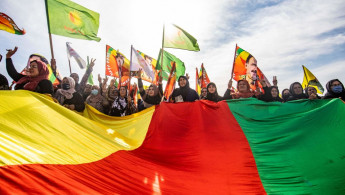Syrian Kurdish leaders meet with Russian FM to discuss regime reconciliation
Syrian Democratic Council (SDC) president Ilham Ahmed, whose group governs northeast Syria, met with Russian Foreign Minister Sergei Lavrov on Tuesday to discuss a political settlement in Syria.
The meeting focused on "the situation in the northeast and …. activating the political settlement in Syria on the basis of UN Security Council Resolution No. 2254", a statement from the Russian foreign ministry read.
UNSC Resolution 2254 was adopted in 2015 to provide a political settlement to the now-decade-long Syrian civil war.
The SDC is the political body governing the Autonomous Administration of North and East Syria (AANES).
This area makes up about a quarter of the country and holds most of its wheat and oil resources. The AANES has enjoyed political autonomy from Damascus since 2013, and is mainly ruled by the area’s Kurdish population.
The "most important point" of the meeting was the negotiations between Damascus and the AANES, according to the SDC's official press page.
Since Turkey launched Operation Peace Spring in northeast Syria in October 2019, the AANES has been engaged in on-and-off-again negotiations with Damascus under Russian supervision. Until now, negotiations have mostly stalled, reportedly due to the regime's refusal to afford the AANES autonomy under any future deals.
"It is through the Russian track that the SDC sees the best opportunity to move the Assad government toward a deal that would retain the local power of the Autonomous Administration," Nicholas Heras, the coordinator of The Newlines Institute's Human Security Unit, told The New Arab.
On Monday, the military arm of AANES, the Syrian Democratic Forces (SDF), said that Damascus was "not ready for any political settlement in Syria".
It added that the Syrian regime was the cause of the worsening economic crisis which the country has been going through since 2019, and that the people of northeast Syria must "confront this tyrannical policy".
The AANES turned to Moscow for mediation between itself and the regime in 2019, after US forces temporarily withdrew from their positions in advance of Turkey's offensive.
After Tuesday's meeting, the Russian Ministry of Foreign Affairs "affirmed its readiness to continue efforts to help… restore the sovereignty and territorial integrity of Syria… and to guarantee the legitimate rights of all ethnic and religious groups in the country".
The statement reflected the balancing act Russia must play as mediator, as the Syrian regime is seeking to incorporate the SDF into its army and reduce the political authority's autonomy.
This is similar to the role Russia nominally played in the country's south, where it acted as a guarantor for "settlement agreements" between former rebels and Damascus.
On the other hand, the Kurds who dominate the AANES, fear that they will lose their hard-earned rights.
The Syrian regime has a history of oppressing the country's Kurdish minority, including through Kurdish-language bans and depriving some Kurds of Syrian citizenship.
"Russian decision-makers see the usefulness in an organised local administration with a proficient local security force in northeast Syria as a good, interim arrangement to stabilise Syria," Heras said.
"The Russian-led dialogue is the venue for determining the future internal structure of Syria," he added.





 Follow the Middle East's top stories in English at The New Arab on Google News
Follow the Middle East's top stories in English at The New Arab on Google News


